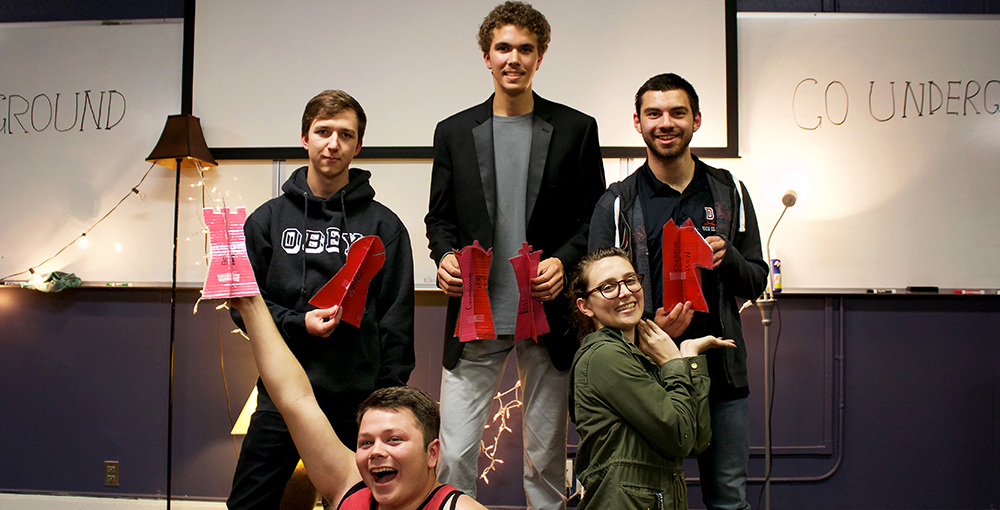This story first appeared in the October 2017 edition of The Hilltop.

Students on their way to class during the past few weeks noticed a single piece of paper with a curious message on it: “Go Underground.” The slips of paper appeared in various places, including the PVG basement, of all places. The question of what this slip of paper was referring to was finally brought to light when a link to a short film was emailed to all students. The four-and-a-half minute film promoted the Cineclub’s film festival competition that took place within 48 hours between 4 p.m. Friday, Oct. 6, and 4 p.m. Sunday, Oct. 8.
“The paper slips were a teaser to get people wondering what they meant,” Cineclub member Olivia Giglio said. “Instead of just posting event posters around campus, we thought it would be cooler to grab people’s interest with something that had no explanation at all. That made it more fun to release the promo video as a ‘Look–here’s what you’ve all been waiting for’ sort of thing. I think they were definitely effective. We heard a lot people wondering about it and even heard that some conspiracy theories were formed in the process.”
Missy LeDoux, president of Cineclub, said what inspires her to create short films is different all the time.
“Sometimes it’s just an emotion you’re trying to convey,” LeDoux said. “In general, we want to make films of power and purpose. And they can be funny, and they can be something we have fun with.”
Claire Kasten, who played the lead role in the promo film, shared what it was like to make the film.
“Making the promo video was the first time I made a short film, and I really enjoyed it,” she said. “After filming, seeing what we had created was a really awesome feeling of accomplishment.”
Teamwork is important to Kasten, who said that “team effort is probably my favorite thing about making short films. It’s really fun to work as a group and see our ideas come to life. There is so much more that goes into making short films than I previously thought. People write, act, film, direct, edit and so many other things.”
LeDoux said she is eager for new members to join.
“I would just love for anyone who has a desire for being behind the scenes or has an idea that they want to turn into a visual format in some way, I’d love to reach any of those people,” she said.
According to Giglio, the film festival is a chance to explore the students’ creativity.
“The 48-Hour Underground Film Festival is meant to be a fun, relaxed event that allows students the opportunity to make a short film and submit it to a festival, whether or not they have state of the art equipment or have ever even made a film,” Giglio said. “We want to get the students involved in the creative process of working with others as a team to make something special and to experience the fun that comes with filmmaking. After all, that’s how Cineclub first began.”
“Cineclub is less about making the next Academy Award winning film than it is about having fun making something meaningful that everyone can be a part of,” she added.
Several of Corban’s professors decided to join in the fun as judges, including Colette Tennant, Steve Halliday and Jim Hills.
The films were judged based on their overall creativity using film criteria, cinematography, storyline, audience engagement and editing. Awards were given for Best Picture, Best Cinematography, Most Experimental and Best Performance.
“Imploding,” directed by Michael Schmidt, won Best Picture and Best Cinematography. “The Rook Crook,” directed by Phillip Ganchenko, won the award for Most Experimental. “Die for Dance,” directed by Kelton Hedstrom, won Best Performance.